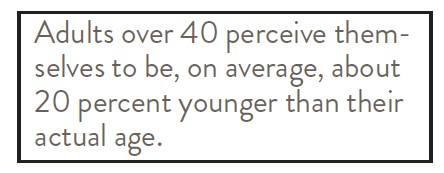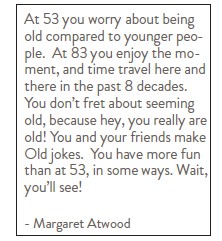That’s a stupid question. Of course, I know the year I was born. I know how old I am. Yes, you do indeed know how old you are chronologically, but your mind can play games and the age you feel in your head is not necessarily the age on your birth certificate. Jennifer Senior writing in The Atlantic back in April found that the age we think we are in our heads is on average about 20% younger than what our birth certificate says. Once we get over 40 our minds start turning back the clock. The 45-year-old thinks she is 35, the 55-year-old feels 45.
This is not necessarily a bad thing. If you think you are younger than you are chronologically, your mind is telling you, you still “got game,” there are still things to accomplish, and you have the energy and time to do it. Optimism is a good thing. Also, we are actually living longer. The oldest Generation Xer (the generation born between 1965 and 1980) will reach full retirement (age 67) in 2032. At that point, healthy, nonsmoking males have a 47% chance of reaching age 90, and healthy nonsmoking females, a 57% chance.

Two side notes here, however. Covid threw a cog in the wheel of the inexorable march to a longer life. Life expectancy at birth for men declined to 73 years in 2021 from 75 before the pandemic and for women from 81 down to 79. With more Covid-type pandemics, a longer life may not be as long as we thought. A second side note, not every group wants to see themselves as younger. Those under 25 often want to feel older, more mature, and be taken more seriously.
If there are positives to feeling younger than you are chronologically, there are also downsides. One is that it is difficult to escape the aging process (although cosmetic surgeons would strenuously disagree). A 45-year-old woman once told me that when she stopped coloring her hair, younger men would look right through her when she entered a room, as if she wasn’t even there. It didn’t matter if she felt 35, she still looked 45. A depressing realization.
Another downside to not fessing up to your biological age is how this could affect your retirement years. If you don’t face up to old age and what you need financially but instead focus on the present, you end up consuming more today and saving less for the future. A big mistake since many of us are hopefully going to live 20 to 40 years after our day job ends.

On balance, it is a good thing that most of us think we are younger than our biological age. It puts a bounce in our step and adds an optimistic tone to our life. Researchers at the Brookings Institute have found that happiness is high among 18 to 21-year-olds, then falls steadily through middle age (age 40 or so), and then rises again in later years, peaking at age 98! The author Margaret Atwood notes this in her quote to the left. And there is even an extra bonus here. Remember that when you get to age 98, you will still only feel 80 in your head!